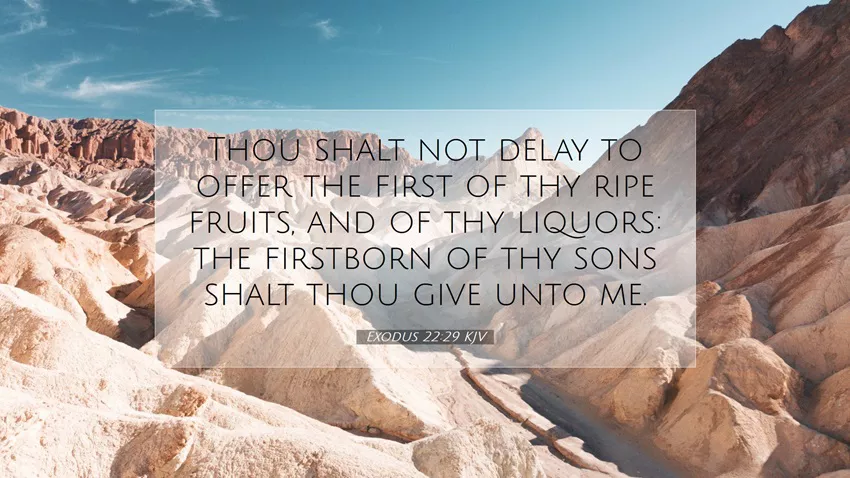Read the Daily Bible Verse – Exodus 22:29 To Strengthen Your Spiritual Journey.
Exodus 22:29 is a profound verse in the Bible that holds significant theological, ethical, and practical implications. Found within the Old Testament, it emphasizes the principle of offering the first and the best to God. This article explores the meaning of Exodus 22:29, its context, applications, and relevance to contemporary life.
The Context on Exodus 22:29 KJV
Exodus 22:29 in the King James Version reads:
“Thou shalt not delay to offer the first of thy ripe fruits, and of thy liquors: the firstborn of thy sons shalt thou give unto me.”
This verse is part of the covenant laws that God gave to the Israelites through Moses. These laws, found in Exodus chapters 20 through 23, outline ethical behavior, social justice, and religious obligations. Exodus 22:29 specifically addresses the Israelites’ duty to prioritize God in their offerings.
Historical Context
In ancient Israel, offerings were central to worship. God had established a system where the first fruits of the harvest, the firstborn of animals, and even the firstborn of humans were consecrated to Him. This was not merely a ritual act but a declaration of trust in God’s provision and sovereignty.
Cultural Practices
During the time, many cultures practiced similar dedications of first fruits or firstborns to their deities. However, for the Israelites, these offerings signified their covenant relationship with the one true God. It was a reminder of their deliverance from Egypt, where God spared their firstborn during the Passover.
The Exodus 22:29 Meaning
Exodus 22:29 conveys two main themes: gratitude and acknowledgment of God’s sovereignty.
Gratitude for God’s Blessings
By offering the first of their fruits and the firstborn of their sons, the Israelites expressed gratitude for God’s provision and care. The act of giving was not about meeting God’s needs—He needs nothing—but about recognizing Him as the source of all blessings.
Acknowledgment of God’s Sovereignty
The directive to offer the firstborn reflects God’s claim over all creation. It is a declaration that everything belongs to Him, and His authority is supreme. The command to “not delay” highlights the urgency and priority of honoring God in all aspects of life.
Exodus 22:29 Application in Life
How can this ancient commandment apply to us today?
Prioritize God in Our Lives
Just as the Israelites were instructed to give their first and best to God, we too are called to prioritize Him in our lives. This can be reflected in:
Time: Starting our day with prayer and devotion.
Resources: Offering the first portion of our income to support God’s work.
Talents: Using our skills to serve others and glorify God.
Trust in God’s Provision
Giving the first fruits required faith that God would provide more. Similarly, trusting God with our resources demonstrates our reliance on His sufficiency rather than our own.
Comparison with Other Biblical Texts
Exodus 22:29 aligns with several other scriptures that emphasize giving and consecration.
Proverbs 3:9-10
“Honor the Lord with thy substance, and with the firstfruits of all thine increase: So shall thy barns be filled with plenty, and thy presses shall burst out with new wine.”
This passage echoes the principle of prioritizing God and promises blessings in return.
Malachi 3:10
“Bring ye all the tithes into the storehouse, that there may be meat in mine house, and prove me now herewith, saith the Lord of hosts, if I will not open you the windows of heaven, and pour you out a blessing.”
Malachi emphasizes the relationship between faithful giving and God’s abundant provision.
Romans 12:1
“I beseech you therefore, brethren, by the mercies of God, that ye present your bodies a living sacrifice, holy, acceptable unto God, which is your reasonable service.”
In the New Testament, giving takes on a broader dimension where believers are called to offer themselves fully to God.
Modern-Day Relevance
Exodus 22:29 remains relevant in modern times, teaching timeless principles for believers.
Generosity in Giving
The principle of first fruits challenges us to be generous with our time, talents, and treasures. It reminds us to prioritize God over materialism.
Dedication of Children to God
While we no longer offer firstborn children as a literal sacrifice, the dedication of children to God remains a cherished practice in many Christian traditions. It signifies a commitment to raise them in faith.
Living a Consecrated Life
The verse calls us to consecrate every aspect of our lives to God, ensuring that He is glorified in all we do.
Conclusion
Exodus 22:29 is a profound reminder of our duty to prioritize God in all we do. It underscores the principles of gratitude, trust, and consecration, which remain relevant across generations.
By understanding the context, meaning, and application of this verse, we are encouraged to live lives that honor God, trust in His provision, and reflect His glory to the world.
As we meditate on this scripture, may we be inspired to give our first and best to the Lord in every aspect of our lives.
Exodus 22:29 Commentary
Theological Insights
Exodus 22:29 reflects God’s desire for a reciprocal relationship with His people. He blesses abundantly and expects His people to respond with faithfulness and devotion.
Practical Insights
The urgency in “not delaying” teaches us about the importance of immediacy in obedience. When we recognize God’s blessings, our response should be prompt and heartfelt.
Related topics:


